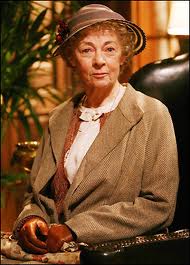Popular Profiles - 02.Agatha Christie

Agatha Christie was a British crime writer of novels, short stories, and plays. She has also written many romantic stories under the name Mary Westmacott. But she is best remembered for her detective novels and short story collections featuring the popular detectives Hercule Poirot or Miss Jane Marple.
Personal Life:
Agatha Christie was born in 15 September 1890 in England.
In 1914, Agatha married Archibald Christie, an aviator in the Royal Flying Corps. The couple had one daughter, Rosalind Hicks. Agatha's first novel, The Mysterious Affair at Styles, was published in 1920.
Controversy:
In late 1926, Agatha's husband, Archie, revealed that he was in love with another woman, Nancy Neele, and wanted a divorce. On 8 December 1926 the couple quarrelled, and Archie Christie left their house Styles in Sunningdale, Berkshire, to spend the weekend with his mistress at Godalming, Surrey. That same evening Agatha disappeared from her home, leaving behind a letter for her secretary saying that she was going to Yorkshire. Her disappearance caused an outcry from the public, many of whom were admirers of her novels. Despite a massive manhunt, she was not found for 11 days.
On 19 December 1926 Agatha was identified as a guest at the Swan Hydropathic Hotel (now the Old Swan Hotel) in Harrogate, Yorkshire, where she was registered as 'Mrs Teresa Neele' from Cape Town. Agatha gave no account of her disappearance. Although two doctors had diagnosed her as suffering from psychogenic fugue, opinion remains divided as to the reasons for her disappearance. One suggestion is that she had suffered a nervous breakdown brought about by a natural propensity for depression, exacerbated by her mother's death earlier that year and the discovery of her husband's infidelity. Public reaction at the time was largely negative, with many believing it a publicity stunt while others speculated she was trying to make the police believe her husband had killed her.
Author Jared Cade interviewed numerous witnesses and relatives for his sympathetic biography, Agatha Christie and the Missing Eleven Days, and provided a substantial amount of evidence to suggest that Christie planned the entire disappearance to embarrass her husband, never thinking it would escalate into the melodrama it became.
The Christies divorced in 1928. During their marriage, Agatha published six novels, a collection of short stories, and a number of short stories in magazines.
In 1930, Agatha Christie married archaeologist Max Mallowan after joining him in an archaeological dig. Their marriage was especially happy in the early years and remained so until Christie's death in 1976.
Her Books:


Almost all of Agatha Christie's books are whodunits, focusing on the British middle and upper classes. Usually, the detective either stumbles across the murder or is called upon by an old acquaintance, who is somehow involved. Gradually, the detective interrogates each suspect, examines the scene of the crime and makes a note of each clue, so readers can analyse it and be allowed a fair chance of solving the mystery themselves. Then, about halfway through, or sometimes even during the final act, one of the suspects usually dies, often because they have inadvertently deduced the killer's identity and need silencing. In a few of her novels, including Death Comes as the End and And Then There Were None, there are multiple victims. Finally, the detective organises a meeting of all the suspects and slowly denounces the guilty party, exposing several unrelated secrets along the way, sometimes over the course of thirty or so pages. The murders are often extremely ingenious, involving some convoluted piece of deception.
Christie's stories are also known for their taut atmosphere and strong psychological suspense, developed from the deliberately slow pace of her prose.
Agatha Christie's first novel The Mysterious Affair at Styles was published in 1920 and introduced the long-running character detective Hercule Poirot, who appeared in 33 of Christie's novels and 54 short stories.
Her other well known character, Miss Marple, was introduced in The Tuesday Night Club in 1927 (short story) and was based on women like Christie's grandmother and her "cronies".
Many of her books and short stories have been filmed, some more than once like Murder on the Orient Express, Death on the Nile and 4.50 from Paddington for instance. Many of her stories have been adapted for television, radio, video games and comics.
In 2004, a 5,000-word story entitled The Incident of the Dog's Ball was found in the attic of the author's daughter. This story was the original version of the novel Dumb Witness. It was published in Britain in September 2009 in John Curran's Agatha Christie's Secret Notebooks: Fifty Years Of Mysteries, alongside another newly discovered Poirot story called The Capture of Cerberus.
Awards, Records and Recognitions:
According to the Guinness Book of World Records, Christie is the best-selling novelist of all time. Her novels have sold roughly four billion copies.
According to Index Translationum, Christie is the most translated individual author, with only the collective corporate works of Walt Disney Productions surpassing her. Her books have been translated into at least 103 languages.
Agatha Christie's stage play The Mousetrap holds the record for the longest initial run. It opened at the Ambassadors Theatre in London on 25 November 1952 and as of 2012 is still running after more than 24,600 performances.
In 1955, Christie was the first recipient of the Mystery Writers of America's highest honour, the Grand Master Award.
In the same year Witness for the Prosecution was given an Edgar Award by the MWA for Best Play.
To honour her many literary works, she was appointed Commander of the Order of the British Empire in the 1956 New Year Honours.
The next year, she became the President of the Detection Club.
In the 1971 New Year Honours she was promoted Dame Commander of the Order of the British Empire, three years after her husband had been knighted for his archaeological work in 1968. They were one of the few married couples where both partners were honoured in their own right.
Death:
From 1971 to 1974, Christie's health began to fail, although she continued to write. In 1975, sensing her increasing weakness, Christie signed over the rights of her most successful play, The Mousetrap, to her grandson. Recently, using experimental textual tools of analysis, Canadian researchers have suggested that Christie may have begun to suffer from Alzheimer's disease or other dementia.
Agatha Christie died on 12 January 1976 at age 85 from natural causes at her Winterbrook House in the north of Cholsey parish, adjoining Wallingford in Oxfordshire (formerly part of Berkshire). She is buried in the nearby churchyard of St Mary's, Cholsey.
References - wikipedia.org